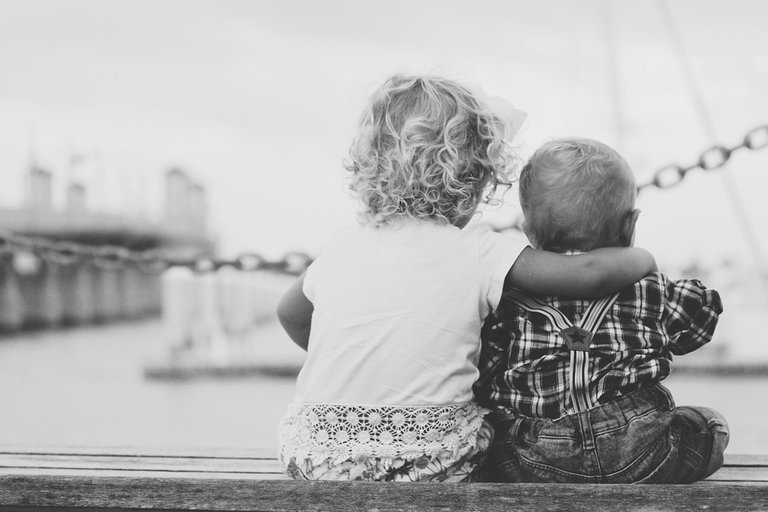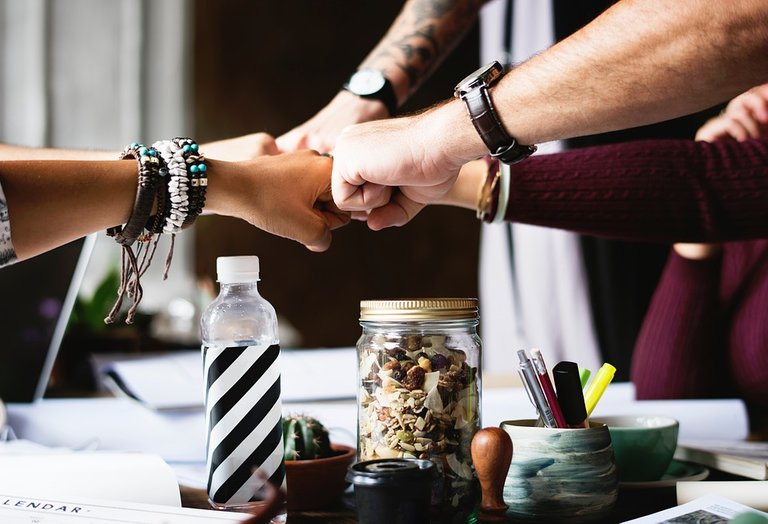A Relationship for Long-Term Happiness - TribeSteemUp's Bi-Weekly Question
Once again @tribesteemup is asking us to share our thoughts, ideas, and ponderings regarding one interesting question. This time it is: What kind of relationship is most vital to long-term happiness: family, friendship, or romantic? It takes some thought even to conceptualize this, because all three types of relationships are important, and although they all make us happy (ideally), they are all completely different. So let me start out by examining each, one by one.
Family, the Trunk Everything Else Grows Out From
First of all, I should mention that not all families are alike, and in fact, what I'm about to write is neither about my own family, nor my idealized concept of what family should be like. It is rather a type of quint-essence of what I have seen around me, in my cultures. Obviously there are exceptions in each direction, and I realize that family relationships have not been the cause of happiness for everyone. Quite on the contrary, actually. But in order to answer this question, those are not the cases I want to discuss here.
One thing is certain, family relationships are meant to be lasting, much more than anything else. While friends come and go, and even our partners may change (no matter how committed we were at one time), it's the relations inside a family that will never change. Your parents, your siblings, and your children will always be your parents, your siblings, and your children. The same goes for your parents' siblings, or your siblings' children. This endurance for life already creates a great deal of stability, which is a pretty important foundation for happiness.
Another characteristic in the family is acceptance. Because the relationships we have inside of a family, we also tend to accept each other the way we are. We may not like everything about each other, but giving each other the freedom to decide how to live our lives is more important than imposing our views on them. The other side of this permissiveness is, that we may end up sharing less time, joy, and passion. We will acknowledge each other as kin, but if we really don't agree we may limit our contact to a few occasional visits.
Friendships, the Outer Extensions to Ourselves
Friends come in all shapes and forms. They may be people we grew up together with, who could be as close as family, or they may be people we only meet to play sports with, or share a beer at the pub. They could even be people we've never met in real life, but exchange deep thoughts with on Steem. And friendships can also have various levels of depth: some are very superficial, others so profound it gets close to how a partner would know you. Ultimately, lots of friendships are not a source of happiness, but once again, that is not what I want to talk about here.
What I think defines a friendship is that it's always up to us how much we want to be friends with someone. We make this decision every time we interact. The only obligation we have is towards the present. Thus, even a friendship going back to childhood could discontinue from one day to the next, if certain conditions aren't met. This fragility of the nature of friendships is also what makes it so precious. It must be cultivated and cared for, or else it will wither and die.
Unlike in a romantic relationship, a friendship has its proper limits. While it is up to us how we set them, we ultimately must keep them, as even the best friend knows that it takes much more to be one's soul mate. But unlike the way our romantic partner leads us to explore our inner depths, a friend will direct us towards the outer world. Depending on who we decide to be friends with, and for what reason, we extend ourselves to the rest of the world. If someone has many good friends, you'll get an impression of them way before even meeting them.
Romantic Love, the Strongest and Most Fragile Bond
Finally, when looking at romantic love, I want to exclude all the emotional roller-coasters, misinterpreted love, and fooled-blinded actions you can see not only Hollywood movies, but sometimes in real life as well. Instead, let's assume you have a long-term partner you know as much as they know you, and you can (and DO) share everything with each other.
Under the right conditions a romantic partner can offer you the deepest happiness and satisfaction, much more than your family and friends ever could. This comes at a price, though. In order to feel comfortable enough to share our lives with each other, we must fully accept everything about each other, and preferably like these traits as well. Sure, one could argue that the pleasure we derive from such a relationship would make up for any minor bad habit, but joy can be fickle. And in order to form a fulfilling bond, one must go deeper, and take the other person 100%, and everything about them.
Does it sound close to impossible, finding someone like that, who also feels the same way about us, and is just as willing to accept everything about us? It just may be. Which is more of a reason to treasure such a relationship once we have found it. We should also keep in mind that love may vanish if it's not nurtured, and unlike in the family, if the bond no longer exists there is no need to stay together... even if we have a family together. Of course this can make everything more complicated, but we have to keep in mind why we decided to be together, and why we shouldn't.
The Key to Real Happiness
After this careful analysis the question still remains: Which type of relationship is most important for long-term happiness? The family, who will be always there, but lets you do your thing? Is it your friends who you can choose and decide how you want to be friends with? Or is it your romantic soulmate, who is ideally most fulfilling, but also the hardest to find and the easiest to lose? I would say to be really truly happy, you need lots of people, preferably a combination of all three types of relationships.
While some people I've known from dysfunctional homes have claimed that their friends were their family, I'd say ideally your family should be your friends. With our siblings we can have the most perfect friendships, and I'd say even with our parents / children, under the right conditions. I also always love when someone says about their partner that they are firstly their best friends. The romantic relationship is only on top of that. In order not to exclude the third combination, I also want to add that I would not mind if two siblings decided to form a romantic partnership. Why not? Who am I to judge?
What I want to stress, however, is that the more relationships you have, no matter which type, the happier you will be. A big family, lots of friends, and maybe even numerous lovers, whether consecutively or at the same time, will ensure that if any of these relationships break, there will be many more around to compensate for the loss.
Please check out these great communities I'm contributing to:

#ecotrain | What is EcoTrain | Discord Community

#tribesteemup |The 8 Pillars of @TribeSteemUp

#team-mexico | Discord Community


#cyclefeed | Introducing CycleFeed | Discord Community



I wish i could find my soul mate...
Well thought out response! Thanks for your insights!
I feel very fortunate to have my sister as a good friend and also my husband is my best friend - very fortunate indeed!